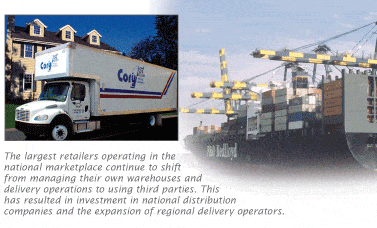Recent International Furniture Transportation and Logistics Council conference tracks trends and advances that will affect furniture retailers.
Many furniture retailers are unaware of the professional association that focuses on furniture transportation and operations issues. The unique problems of transporting furniture from manufacturers to retailers and ultimately to customers’ homes has been addressed by the International Furniture Transportation and Logistics Council for more than 80 years. Reflecting the shift to international manufacturing and growth in e-commerce, the name was changed from The National Furniture Traffic Conference in 2000. Issues discussed at their recent annual conference are of importance to furniture retailers of all sizes.
Retailer participants at their May 2007 annual conference included well known large operations like IKEA, Crate & Barrel, Art Van and City Furniture as well as smaller companies eager to strengthen skills in managing their overall supply chain. Companies represented every part of the business including those that handle transportation from overseas manufacturing plants, national third party logistics providers, regional warehouse/ delivery operators and local delivery companies. Manufacturers also were active participants. Some of the issues that are of interest to home furnishings retailers have been abstracted below.
Home Delivery: In the home delivery area, the primary challenge discussed was “alleged” product damage at customers’ homes. Companies that thoroughly researched this issue have found that while some damage is genuine, a significant portion is related to misrepresentation of product quality at the point of sale, and buyer’s remorse at the point of delivery.

Obviously these factors are largely outside the control of the delivery operation, whether it be handled by store employees or an outsourced transportation company.
Packaging Quality: Product and packaging quality is acknowledged to be an ongoing problem for conventional brick and mortar retailers and Internet retailers. The costs of returning or exchanging a refused product can exceed the original margin on the sale. Retailers that include proper packaging in the criteria for vendor selection are getting superior results. Standard mattress and upholstery bags require special handling throughout the delivery process. Boxed items may be adequately packaged for container shipping from offshore, but are often inadequate for the handling they receive from most trucking companies. Retail delivery operations and specialized furniture carriers noted that they are working to minimize these problems through employee training and equipment selection. Employee motivation and efforts to reduce delivery team turnover are also crucial. Delivery people who are passionate about their work and receive a fair wage are a key element in any retailer’s effort to ensure customer satisfaction.
Outsourcing Delivery: The largest retailers operating in the national marketplace continue to shift from managing their own warehouses and delivery operations to using third parties. This in turn has resulted in significant investments in national distribution companies, such as the Exel purchase by DHL and expansion of regional delivery companies. Well known companies like Joseph Cory Companies, MGM Transport and Purnell Furniture Services have also expanded their capabilities to meet the needs of their retail clients.
Port Bottlenecks: The ever increasing volume of Far East manufacturing has strained USA west coast port capacity as well as the transportation inland infrastructure. West coast ports are not well equipped to handle the large super ships now in service between Asia and Europe and the East Coast. Improvements at Los Angeles-Long Beach are years away, so smaller ports such as Oakland are being used to move goods in a more timely manner.
Rail Improvements: The rail lines that move the containers inland are also congested, and are experiencing significant delays. Intermodal transportation is the fastest growth area for the railroads. It is efficient with double stacking containers, and is cleaner, safer and more cost effective than over the road transport. Congestion is being alleviated by double tracking and other improvements.
Conclusion: The bottom line for furniture retailers is that today’s supply chain is far more complex than in prior years. There will be many more changes down the road. Major efforts by some suppliers are simplifying supply chain management through the application of technology and intermediate warehouses, but that isn’t the answer for everyone. As retail purchases direct from offshore sources continue to accelerate, more in-house expertise will be needed.
The one constant in all of this are the expectations that consumers have when the delivery truck pulls up. How you fulfill, or come up short in relation to these expectations is one of the most important determinants of how your best customers perceive your store brand.
For information about The International Furniture Transportation and Logistics Council visit www. Itftlc.org or call Ray Bohman at 508-945-2272.
Daniel Bolger, P.E. provides operations consulting
services to clients throughout North America. You can contact Dan at bolger@furninfo.com for more information on this or other transportation, logistics and furniture warehousing topics. Go to www.furninfo.com to read all of Dan’s articles.